War Veterans with PTSD say Burilović's Explanation Misleading
ZAGREB, 12 February, 2021 - The national federation of war veterans treated for PTSD has described as inappropriate and potentially manipulative Croatian Chamber of Commerce president Luka Burilović's explanation of his out-of-turn vaccination against COVID-19, in which he cited his status of disabled war veteran.
"The explanation creates room for a false perception that Croatian war veterans have priority in vaccination over other citizens, people with chronic diseases and people with disabilities. We find it important to once again stress that many disabled war veterans suffer from many other chronic diseases, which puts them among at-risk groups, yet despite that, they are still patiently waiting for their turn to get vaccinated, just like other citizens," the federation said in a statement on Friday.
It called on citizens, notably those holding various public offices, to set an example to others and to have understanding for people with chronic diseases for whom vaccination can mean survival as well as to respect the vaccination priority list.
For the latest on coronavirus in Croatia, follow the dedicated TCN section.
Alemka Markotić: My 84-Year-Old Mother was Vaccinated, at Least 1 Reporter Jumped Queue
ZAGREB, 12 February, 2021 - The head of Zagreb's Infectious Diseases Hospital, Alemka Markotić, confirmed on Friday that her 84-year-old mother, a chronic patient, had been vaccinated in that hospital, and when asked whether that was a case of abuse of position, she said at least one reporter had already been vaccinated.
"How many times have you broken (the rules) by calling me and my colleagues, asking favours for your parents, loved ones... Both your parents and my mother and all other people who could and should have come could come to the hospital. At least one of you sitting here skipped the line to be vaccinated," Markotić said.
Markotić, who is a member of the national COVID-19 crisis management team, did not say the name of the reporter who had jumped the queue to be vaccinated, but she said that he was present at the press conference, after which reporters denied they were the ones who had been vaccinated.
Answering reporters' questions, Markotić confirmed that her 84-year-old mother, who is suffering from several chronic diseases, at least two of which are connected with serious COVID complications, had been vaccinated at the hospital where she works.
"She has recently had an extensive and difficult operation, so I do not see why she could not be vaccinated if she is my mother," she added.
Markotić: Nowhere does it say no elderly persons outside of care homes can be vaccinated
In a reply to a reporter's statement on "getting vaccinated ahead of the line" and asked based on what criteria her mother got vaccinated, given the fact that the first phase of Croatia's vaccination plan has not been completed, Markotić underscored that there were no criteria saying where her mother could be vaccinated although she was not in a care home.
"You stated that persons were vaccinated ahead of the line and using favoritism," she told reporters.
"Nowhere does it say that no elderly person can be vaccinated if they are not in a care home; nowhere does it say that a health worker must be vaccinated in their own health institution," Markotić stressed.
The head of the national COVID-19 team, Minister of the Interior Davor Božinović, said that the director of the Infectious Diseases Hospital lived with her mother, who might not be in the first category according to the priority plan, but given Dr Markotić's profession, she might be even more at risk than others.
Asked by reporters about her attendance at a mass for the Blessed Cardinal Alojzije Stepinac on 10 February, when more than 25 people gathered outside the Zagreb Cathedral, Markotić said that she had attended the mass as a private person, not an organiser or someone who could determine the number of people attending.
She denied media claims that she had held a speech at the mass.
Asked by reporters whether she would resign due to her attendance at the mass and her mother's vaccination, Markotić did not respond, saying she was a target of a lynching campaign.
She said there were people above her, as the director of the Infectious Diseases Hospital, to whom she would answer.
For the latest on coronavirus in Croatia, follow the dedicated TCN section.
Davor Bozinovic Explains Details of New Measures Valid from 15 to 28 February
February 12, 2021 – At today's press conference of the National Civil Protection Headquarters, Interior Minister Davor Bozinovic presented and explained the details of the new epidemiological measures announced by Prime Minister Andrej Plenković at yesterday's Government session. Namely, from February 15, caterers will be allowed to sell coffee to go, fitness centres, gyms, and bookmakers will be able to open. Students will be able to study in foreign language schools and in workshops.
The new eased measures, created by the Headquarters and the Government's reflection, will be valid until 28 February.
An epidemiologically, but also sociologically and psychologically justified approach
"We know how the situation can get worse in a short time. We don't expect this, but we must be careful. In the last seven days, we've even managed to get into third place in terms of incidence in Europe. But our primary interest is to lower the numbers of new infections so that, compared to other EU members, we now have the least stringent measures in Europe, which means that this effort is paying off. We must not relax totally, and just because we didn't do so before, we're able to ease some measures now.
February 28th is going to be here in less than two weeks, and from today we'll be thinking about measures that could be further relaxed if the trends remain like this. We don't know what that's all going to look like at the moment. Still, we're going to closely monitor everything that is happening, especially in regard to to the new variants, where the profession, primarily epidemiologists, have an essential role," said Božinović.
He added that they're advocating for a gradual approach that is epidemiologically but also sociologically and psychologically justified. From day one, they've been trying to learn as much as possible about the virus and society's behaviour, and they're also taking a new strain of the novel coronavirus and its appearance in Croatia into consideration. He spoke about the easing of the country's measures in five categories.
The delivery of food, beverages, and desserts from catering facilities:
Those who pick up food and beverages must not stay on the terraces and in front of the buildings or enter the buildings. While waiting in line, they should maintain space between each other and wear masks. Staying in front of the building shouldn't be encouraged by things like playing music, the terraces should be fenced off, and tables should be removed or arranged in a way that they can't be used. Notices must be posted on facilities prohibiting entry, the maintaining of social distancing, and so on.
2. Gyms and fitness centres:
The maximum number of people inside - one person pet 20 square metres - should be taken into account, as well as proper ventilation. If the building doesn't have such artificial ventilation, the premises should be ventilated every ten minutes. Exercise machines should be disinfected after each use. Users are allowed to use only their own towels and gym mats etc. They should avoid close contact and maintain a distance of four metres between each other. The use of shared showers is still prohibited. A list of such users must be kept, and masks must be worn on arrival and checkout, as well as during registration.
3. Language schools:
It's necessary to limit the number of users per group to maintain a distance of two metres. In addition, masks are mandatory. Lecturers/teachers must keep their distance from the participants/students, wear a mask or separate themselves totally plexiglas, they must also measure temperatures. A list of participants should be kept here, too.
4. Children's workshops and playrooms:
It's necessary to limit users to one person per seven square metres and highlight that notice at the facility's entrance. You should maintain a distance and wear masks, ensure disinfection, as well as the proper disinfection of devices and toys, and of course, measure people's temperatures when they enter.
5. Slot machine clubs, bookmakers, and casinos:
Betting places/bookmakers – epidemiological measures apply here in the same way as they do for stores, depending on the facility's size. The number of people entering should be limited. Users should wear masks and keep a distance from each other, staff also, who should be separated from users with plexiglas, and they should disinfect the facility.
Slot clubs and casinos – the number of users should be limited to one user per seven metres of gross usable space. The catering part of these facilities must be closed off. Catering services can't be provided in such facilities.
When asked why children who train indoors still cannot go to their training, and bookmakers are allowed to work, epidemiologist Bernard Kaić answered, but before that, Božinović pointed out:
"Graduality means that we can't let everything open at once. We're easing these measures in a certain order, about which we've concluded at meetings. Some arguments prevail a little more in some places, others do so in other places. Epidemiologists will create a framework by which almost anything can be maintained. Still, we're going to take care to adopt our measures that favour children, which was the argument when we opened schools. The profession recommends that when we ease things, we need to first give preference to children, schools, workshops, and playrooms because children are the ones who find living like this the most difficult to grasp. Those who are older can understand the situation better. We aren't comfortable making such decisions either, but we're making them together," said Božinović.
Basic rules: limit gatherings and use your own initiative:
"Every activity carries a risk. The epidemiological framework can provide guidelines for risk reduction, but in some situations, no epidemiological framework can eliminate the risk entirely, and then the priority activities must be determined. This was discussed at the Government and the Headquarters' meeting, and this all resulted from those negotiations. Children's playrooms also pose a risk, as do children's sports and going back to school and kindergarten and the like, as well as me just going to the market. But I prefer to go to the market than to do some other activities. I agree that if all measures were eased up at once, we'd very easily have an increased number of patients. Yesterday, a Government Council member stated that there are only three basic rules: limit gatherings, small groups, and take the initiative. All of these measures that are introduced or relaxed only serve to limit gatherings, smaller and larger ones, to reduce close contacts," Kaić explained.
Božinović also referred to schools and school halls. They allowed offline classes and made sure that different classes don't interfere with each other, and that children don't all come to school at the same time. Since children aren't divided into sports groups as they are in classes, if the school halls are open, there would be more mixing between them, and then the possibility of spreading the virus is increased.
The above decisions will be valid for two weeks, and then the Headquarters will think once again about the further opening up of other facilities if the number of infections continues to fall.
Source: Jutarnji.hr
Croatia's Antun Račić Defends His Title at KSW 59
February 12, 2021 - The KSW bantamweight title will be on the line at KSW 59: Fight Code on March 20th when Croatia's Antun Račić (25-8-1) defends his belt against Poland's Sebastian Przybysz (7-2) in the co-main event.
Račić has been a dominating force since entering the promotion in 2017, winning six fights in a row. The 30-year-old made history at KSW 51 in his native Croatia by becoming the first-ever 135lb champion in KSW history with a win over veteran fighter Damian Stasiak.
The pride of Dubrovnik successfully defended his title against top Brazilian prospect Bruno Santos in his most recent contest this past December and will aim to hold onto the title when he meets the challenging Sebastian Przybysz in a rematch of their bout from 2018.
Since their last meeting, Przybysz has had three impressive wins in a row with victories over European MMA veterans Bogdan Barbu & Lemmy ‘The Dog’ Krusic, and, most recently, he avenged his first professional loss by stopping the highly rated Jakub Wikłacz.

Now the 27-year-old will be aiming the avenge his only other loss and, in doing so, realize his dream by capturing the KSW bantamweight title from Antun Račić.
KSW 59: Fight Code takes place March 20th and is available to watch worldwide on KSWTV.com and the KSW App on iOS & Android.
Learn more at https://www.kswmma.com/
To read more about sport in Croatia, follow TCN's dedicated page.
Young Slavonian Mato Topic Returns from Germany to Zagreb
February the 12th, 2021 - A lot can be said for the grass being greener on the other side, and there can be no argument against the fact that Croatia has terribly neglected the eastern part of the country economically and in other ways, but for some, it takes actually leaving to see that the grass is green wherever you water it. Mato Topic from Slavonia experienced precisely that and decided to return home from Germany.
As Poslovni Dnevnik/Bruno Lipej writes, Young Slavonian Mato Topic returned back home to Croatia a year and a half ago after spending three years living and working in Germany. He says that his acquaintances spoke to him in amazement: "Well, what are you going to do?" or, perhaps somewhat more honestly, "You're the only one coming back, what an idiot you are…"
He knew that he wouldn't have the standard of living and the style of an orderly life he had become used to in the German border town of Lorrach, located near Basel, when back home in Croatia, but his heart was aching for home.
"I can't explain it to you, in Germany I basically lacked nothing at all, but every time I crossed the Croatian border it was as if I was starting to breathe a pair of full lungs," he told Vecernji list. To make the story more interesting still, family wasn't the reason he left, as he he left behind his parents, brother and sister in Germany.
Until going to Germany, everything was more or less typical in Mato Topic's life in Slavonia. Both of his parents worked, but the family of five from Cepin didn't live in abundance with their Croatian salaries. Along with the daily sacrifices and efforts in the Cepin yard which belonged to Mato Topic's family, a new house was built. However, it seemed to his parents that the prospects werent' great for them or the children, and that things would simply stagnate. In 2013, when Croatia joined the European Union, they decided to leave Croatia and went to Germany.
"I knew that I'd really have to roll up my sleeves and that in Croatia I'd have to work much harder for a lot less money," said Mato Topic, who decided to return not to Slavonia, but to the far more prosperous capital of Zagreb. He wasn't unprepared for a starting salary of 3,500 kuna working in a call centre, though.
“In the meantime, I progressed, I became a deputy leader, I also led some training… Money is important, especially when you're young and have a lot of wishes and plans. But it's definitely not the most important thing. I was in Germany despite feeling like a total foreigner there. I realised that I didn’t want to wait for my annual holiday to come home every year, nor to build my life and start a family in the long run in a foreign country. My parents supported me,'' he said.
"With all the shortcomings and irregularities in Croatia, and even injustices, I have confidence in Croatia. I just feel that way,'' the hopeful Mato Topic told Vecernji list.
For the latest travel info, bookmark our main travel info article, which is updated daily.
Read the Croatian Travel Update in your language - now available in 24 languages.
Croatia's Default Negativity: a Hong Kong Perspective from Split
February 14, 2021 - There has been a lively discussion on TCN recently after the default negativity in Croatia. We are delighted to welcome Valeria Teo to give us a Hong Kong perspective from Split.
The recent TCN article What Happens When a Foreigner Writes Positively about Living in Croatia? has had my inbox a little fuller than usual, with some very interesting contributions. Among them, Valeria Teo, a Split resident for more than a decade after originating from Hong Kong. Here is her very interesting Hong Kong perspective.
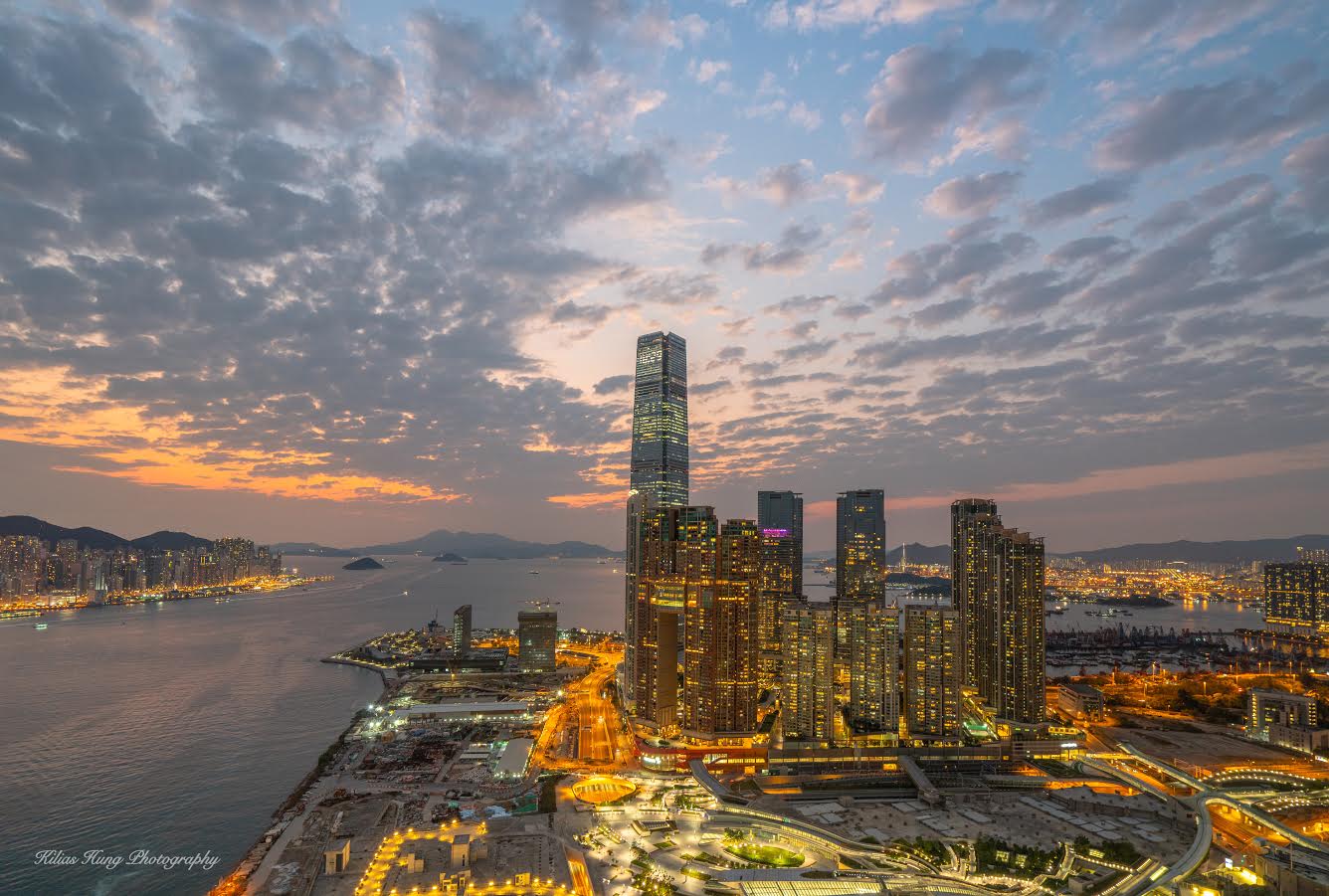
{Photo credits Kilias Hung)
I read this interesting article about what happens when a foreigner writers positively about Croatia as I am entering my 11th year of living in Croatia. In case these questions start popping up in the minds of some local readers, they may rest assured that I am not a millionaire, nor was I running from something in my own country 10 years ago (this may change now but more on that later) and never have I worked for any intelligence agency. It hit me a few days later that these little amusements could actually be serious disclaimers. A new perspective has started to dawn on me. This Croatian negativity on foreigners choosing to live in this country suddenly makes sense to me. What I mean is that I have started to feel the hurt when Croatian people ask foreigners those questions. The 10-year residency here certainly helps me understand the reasons. But I grasp it on an emotional level, strangely, because of what is going on in Hong Kong, the city I have left behind.
When I turned up in places, like a klapa concert or the 100th birthday for Hajduk in Poljud, 10 years ago, local people did not expect to see foreigners, let alone an Asian face. I was answering those typical questions over and over again for quite some time. While having a Croatian husband eased some suspicion, my main reason for moving here raised other eyebrows. They could not understand why a country with an unemployment rate over 20% was a better place to raise kids than a city with almost no unemployment at that time. They saw no future for my son here. Some might even secretly wait and see when the realities in this country would force our departure, sooner or later.
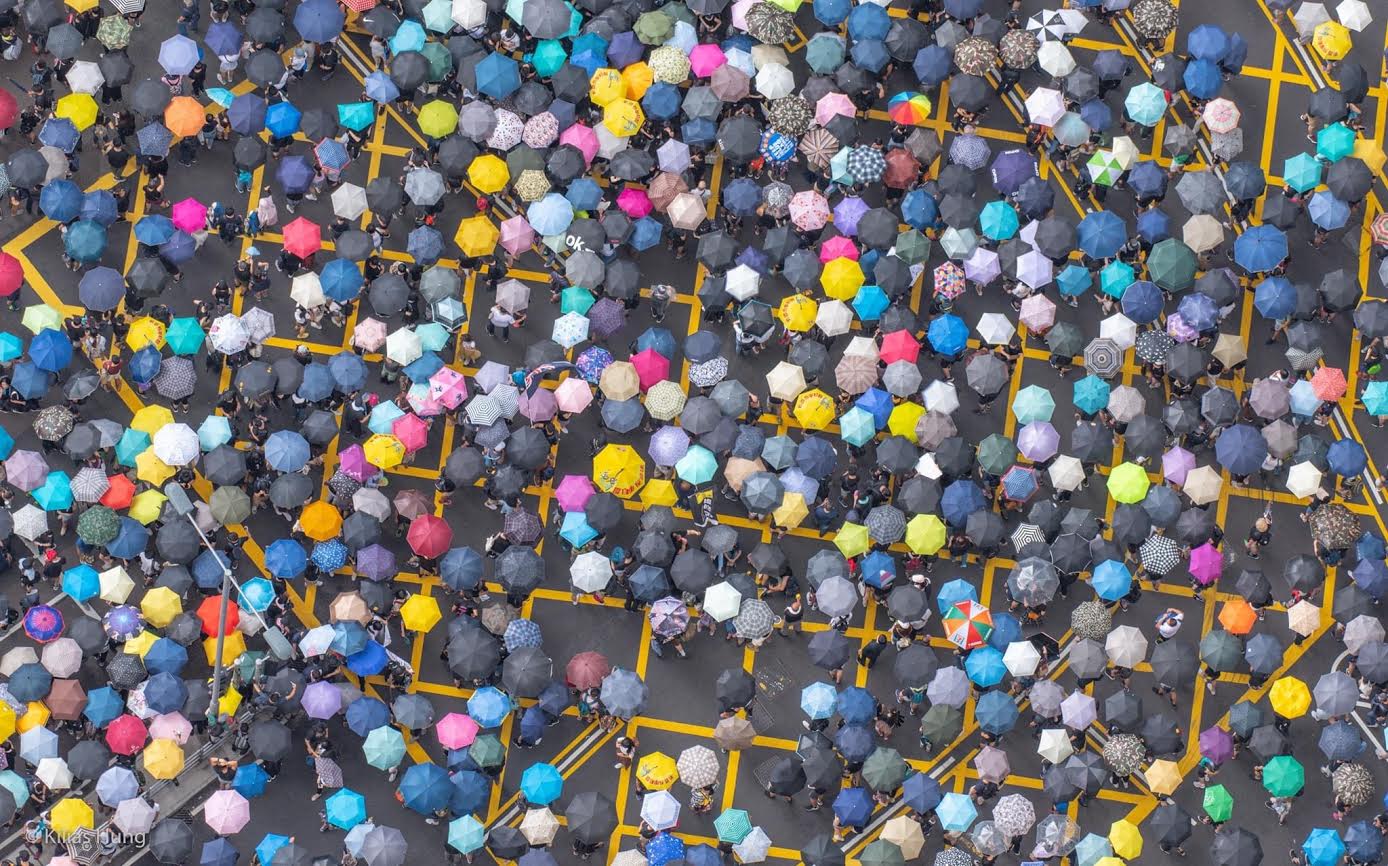
(The 2019 demonstrations - Kilias Hung)
I have met a whole spectrum of local people in the last 10 years. Whether they are positive or negative about their own circumstances or the country in general, almost all Croatians I have met are unwilling to leave their motherland. They love their country but hate the circumstances surrounding their livelihoods in varying degrees. Those who feel more helpless in their own situations are usually the more negative ones. They express it as anger, depression, bitterness or despair with an underlying agony. The desperate ones eventually try to improve their livelihoods by leaving Croatia. But they never think and want the departure to be permanent.
This, for me, is a familiar story because it is very Chinese as well. It happened to millions of Chinese all through history. I notice lots of similarities between Chinese and Croatian people when it comes to family, home and nation. Stability is at the core of our cultural DNA. So it is easy for me to understand the Croatian reluctance to leave their country and their yearning for home. But I did not see the connection between these cultural values and the negative emotions until Hong Kong started going through the biggest political repression and social trauma.

(This is a mysterious facility on the highest mountain in Hong Kong. The government is very vague about who is using it for what. The red slogans were put there at the beginning of 2021. They read from the top in simplified Chinese (Hongkongers use traditional Chinese): Following the (Communist) Party, listening to the Party. Capable of fighting, capable of winning. Photo credits: Lucia Yang)
Similar kinds of negativity are building up in Hong Kong as nepotism, incompetence, injustice and tyranny are spreading like cancerous cells. It is difficult for me to compare the situations of Hong Kong and Croatia. What I have learned after living in both places is that foreigners can "shield" themselves from the smallest to the biggest problems bothering local people on a daily basis. While foreigners can understand or even empathise with the local people, they rarely have the same kind of ownership to those problems. Foreign understanding of the local situation, no matter how deep or extensive, is still some emotional steps away from the local one. So I am in a strange "no man's land" living in Croatia while checking on Hong Kong. But the negativity, expressed in similar nature and intensity in Hong Kong, seems to show me some glimpses into the Croatian sentiments.
Grief and anger start when the unthinkable world is unfolding and turning the familiar life upside down. Outrage and frustration follow when the worse is never the worst. Bitterness and despair seep through when the unacceptable acts become the new normality. People are traumatized in this process whether or not they are trying to find a way out. Venting is a way to keep their sanity and relieve the agony.
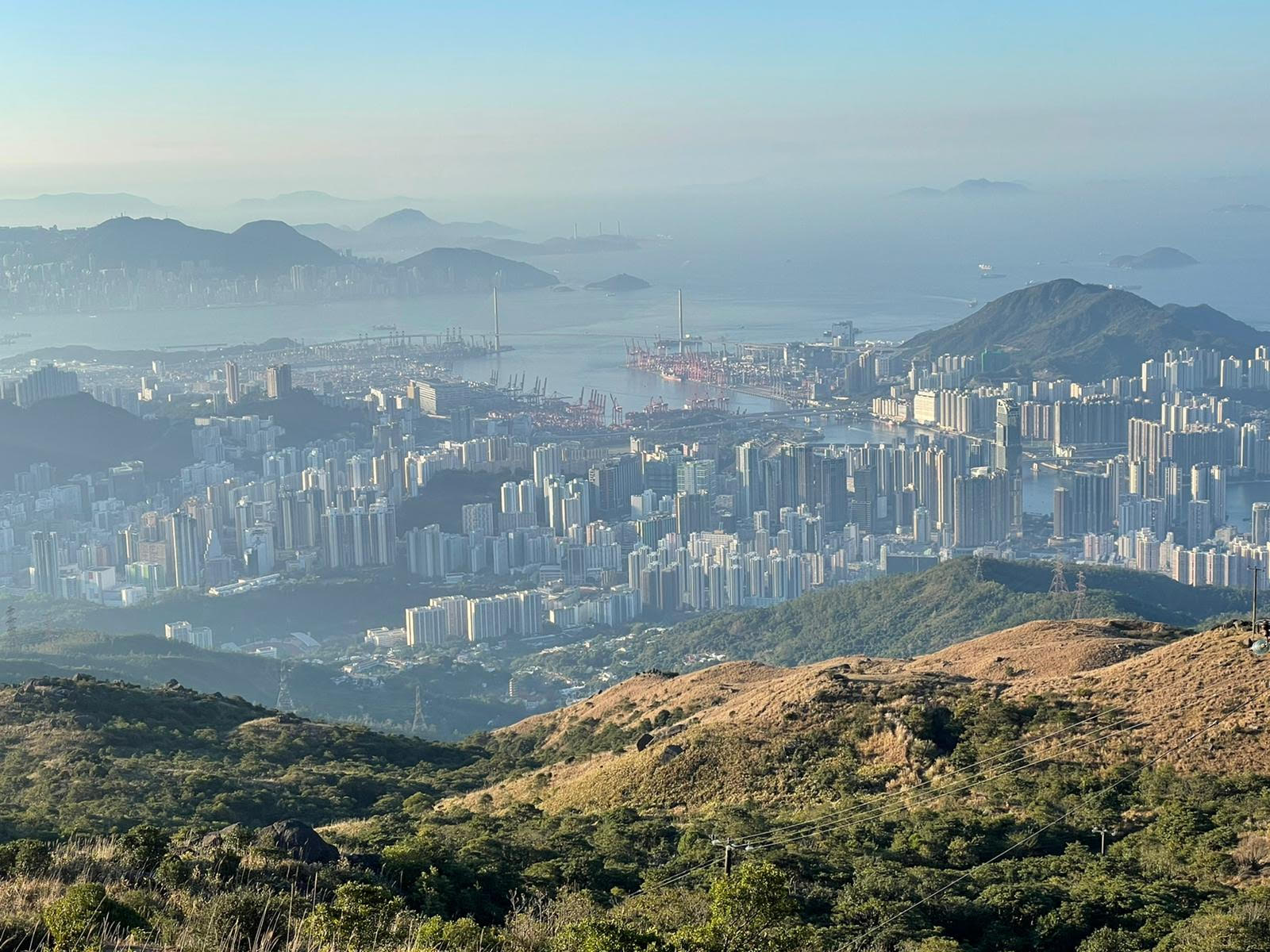
(Photo credit Nelson Tse)
What I have depicted is my own emotional journey through the collapse of a city to which I am not so heavily attached. The hardest blow, for me, is that Hong Kong does not deserve this tragic destiny. When the devastation strikes a place loved as the ultimate home and the best place in the world, the negativity of those people reaches the Croatian level.
I am not saying this is what actually happened to the Croatian people. The collective trauma in Hong Kong I incidentally witness simply gives me a different perspective on what I have experienced here. If Croatia is indeed a precedent of such traumatic malaise, the road of recovery is tortuous. People are just beginning to leave Hong Kong, go into exile, seek asylum or go into jail while the draconian rule is settling in place. Nobody knows how to get out of this dark and seemingly endless tunnel. Many Hong Kong people try to find inspiration and consolation from the works of Vaclav Havel. When I read "Power of the Powerless" 30 years ago, I never thought that it would get popular in Hong Kong. The possibility of that little shop he described in Prague could turn up in Hong Kong is completely surreal. Hope becomes the most valuable thing in the darkest hours. So it comes as no surprise that this quote of Havel's circulates quickly:
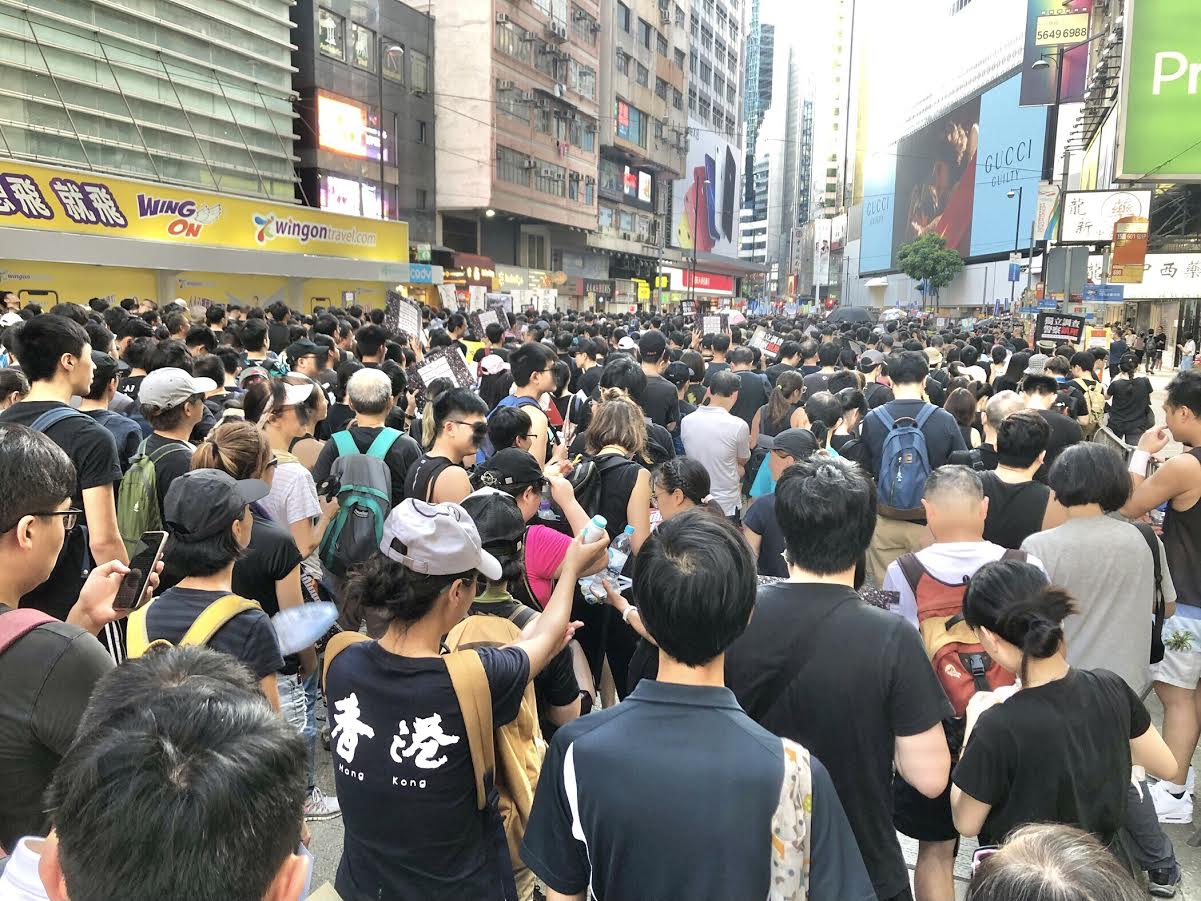
{Photo credits Kilias Hung)
Hope is not a conviction that something will turn out well, but a certainty that something has a meaning regardless of how it turns out.
The situations in Hong Kong and Croatia are completely different now and then. The similarities I have found are perhaps more for my own sake than anything: the kind gestures and the good deeds happening in a country many consider "hopeless" give me hope.
About Valeria Teo:
I left Hong Kong and moved to Split in January 2011 after meeting my husband outside kazaliste in 2007 and getting married in 2008. We have been welcoming guests to our apartments in Radunica since 2014. I also work as a tour leader whenever I feel like having a break from the craziness of being a full-time work at home mother. You may check out our website and follow our Facebook page.
If you would like to contribute to TCN, drop us a line at This email address is being protected from spambots. You need JavaScript enabled to view it. Subject Writing for TCN.
Croatia in 2021: Casinos Open, Cafes Closed; Protests Fined, Masses Blessed
February 12, 2021 - A snapshot of Croatia in 2021, for any aliens looking to learn a thing or two about the quirks of human behaviour.
It has been a funny year.
A year when one's perception of the world and attitudes to the virus changed from week to week.
I remember the feeling of internal panic as we drove off the ferry at Sucuraj on the eastern tip of the island of Hvar almost a year ago, after school closures of two weeks were announced. Varazdin was among the first to have recorded cases in Croatia (I think there were 8 when we headed south), and Hvar had none. What if we brought the virus to the island?
So paranoid was I that I did not go within 2 metres of - or even speak to - anyone outside the immediate family for over a month. When I did leave the house for my evening walk by the Adriatic, I took care to be on the other side of the path if there were any people coming my way. It felt odd and a little farcical, but it soon became normal.
I remember how shocked I was coming back to Zagreb some 63 days after lockdown on Hvar to see a bar crammed full of people with no masks, drinking and partying like it was a regular Friday night in the old normal.
And yet numbers stayed low.
Let me be clear. I am not advocating lockdown, nor am I advocating a full relaxation of measures. My opinion doesn't matter, and I am certainly not qualified to judge what Croatia's correct approach should be. But I am advocating one thing:
Consistency.
As I wrote in my last editorial As Gym Owner Faces Prison, the Virus Must be Laughing at Croatia's Inconsistent Measures, corona is beginning to feel a little like a university course in the study of human behaviour at the University of Aliens on Mars. Just observing the inconsistencies of applications of the measures in Croatia (and many other countries as well). As the aliens will have learned by now, there seems to be one rule for some, and quite another rule for the others.
Back in March, even though the lockdown was hugely inconvenient, I took a strange pleasure in the whole experience. My days were filled with work, so it was never dull, but it felt like we were all in it together. Tough times for sure, but there was a feeling that we all needed to pull together. It took me back to my days as an aid worker two weeks after the genocide in Rwanda, when there was no electricity, running water, and scarcely any food. Alemka and Vili were national heroes, and we took pride in being praised as one of the best global responses to the initial lockdown.
That was then. Inevitably, in Croatia, that feeling of unity did not last, and it was not long before the stories (as in other countries) of 'exceptions' hit the media, with official justifications for each seeming indiscretion. It was election season, as well as the important tourist season, and politics took over as the most important driving factor in the battle against corona. It has remained that way ever since.
I still have respect for Vili and Alemka - their jobs must have been impossible with all the various people pulling them in different directions - but it is clear that politics has overtaken the need for a unified approach that our alien university students would applaud, and any sense of national unity has long since disappeared. Add to that the desperation that people in the hospitality industry (and elsewhere) are feeling, and that lack of consistency and double standards is really beginning to grate.
My visit to Flower Square in Zagreb summed up the absurdity of the situation - cafe life without the cafes. Cafes and their terraces remained shut and off-limits, but you could buy a coffee to go at the bakery and sit on a bench next to the closed cafe terrace. People were actually huddled closer than they would have been sitting at a cafe table.
February 15 was hailed as the date when measures would be eased, when some semblance of normal would return with the opening of at least the outdoor terraces of cafes. To be clear to our alien university students, this would have meant that instead of buying a beer from a supermarket or coffee from a bakery and then sitting on a park bench next to a cafe, people could sit in the relative comfort of a cafe terrace and be served by a waiter some two metres away from the bench.
The announcement for new measures came yesterday, effective February 15 - cafes, like bakeries and other outlets, could now serve 'coffee to go' but would remain shut. Gyms and fitness centres would open, as would foreign language schools, as would casinos, bookmakers and slot machine clubs - all indoor activities of course.
Meanwhile, the one organisation to arrange a protest, Glas Poduzetnika (Voice of Entrepreneurs), was slapped with a 30,000 kuna fine (20 for the organisation, 10 for its president, Hrvojje Bujas). You can read about the protest, which TCN attended, in A Foreign Eye at UGP Croatian Entrepreneur Protest in Zagreb.
Commenting on the situation in the country, National Civil Protection Headquarters member Alemka Markotic said:
“Any irresponsible behaviour that can contribute to endangering someone else’s life and health has elements of bioterrorism as harsh as that word may sound.”
No comment from me either way - my focus is on consistency.
Just days later and a few metres from where the entrepreneurs' protest took place, the annual mass in memory of Cardinal Stepinac on the anniversary of his death, was held. As you can see from the video above, there were several hundred people gathered in the same manner as the entrepreneurs just a few days ago. Whether or not religious gatherings contain the same level of bioterrorism threat as other gatherings is up for discussion, but there was one surprising attendee given her recent comment on bioterrorism - Alemka Markotic from the National Civil Protection Headquarters.
Gatherings are supposed to be limited to 25 people, yet the funeral of a prominent HDZ politician, Miroslav Tudjman, was attended by far more than that, as you can see in the video above. Again, it was explained away as being perfectly fine and in accordance with the rules. And even though restaurants are all closed, the head of the local civil protection unit in Knin denied that he had been in a restaurant (as it turns out with someone who was self-isolating) until confronted with the truth by the media.
All animals are equal, but some are more equal than others.
I was speaking to a young politician recently, who has decided to fight for change rather than emigrate. I asked him how it was going and what the biggest challenges are.
"It is incredible. There are just SO many scandals at the moment, as always. It is impossible to know which one to comment on, as you can't give comment on them all. What is the top story in the morning is forgotten news in the evening."
And so too, it seems, with writing. While writing this article, there have been calls for Markotic to resign after she disclosed that her mother had been vaccinated at her clinic.
And just as I was digesting that news, another breaking story, this one about the one million kuna luxury car bought by the Croatian Chamber of Economy for its leader, Luka Burilovic. This after it emerged that he too managed to get himself vaccinated, days after it was revealed that his income is an eye-watering amount, especially by Croatian standards.
I remember those isolating days of unity with fondness now, a year on. Croatia is a wonderful country with so much potential and such a bright future. Will those fighting for a better tomorrow be able to break the grip of the Mighty State of Uhljebistan?
If you were a betting man in Croatia in 2021, it is something you could have a gamble on at the bookies, but if you wanted to discuss it in a cafe over a coffee or something stronger, you are in the wrong country.
And so the only vocal protest that exists continues. The protest of emigration on the streets of Dublin, Frankfurt, Stockholm and many other cities hosting young Croatians who have made the painful decision that their brighter future perhaps lies elsewhere.
Croatia Logs 371 New COVID Cases, 19 Deaths
ZAGREB, 12 February. 2021 - In the past 24 hours there have been 371 new cases of COVID-19 registered in Croatia and 19 people have died, the national COVID response team reported on Friday.
There are currently 2,471 active cases in the country, including 1,007 hospitalised patients, 91 of whom are on ventilators; 12.946 people are in self-isolation.
To date, a total of 1,255,786 tests have been conducted, of which 4,931 in the past 24 hours.
Since 25 February 2020, when the first case was identified in Croatia, there have been 237,080 registered cases of coronavirus infection in the country; 5,282 people have died as a result while 229,327 have recovered, including 431 in the past 24 hours.
For the latest news on coronavirus in Croatia, check out the dedicated TCN section.
Lozovac, Torak, Čikola? Choose Best Name for New Modern Boat in Krka National Park
February 12, 2021 – This spring, a new modern boat will sail along Krka National Park's favourite excursion route – from Skradinski Buk to Roški Slap waterfalls. Everything is set to sail, except for the boat's name. To contribute to Krka National Park and its offer, you can choose the name that suits the boat the best in an online poll.
As Krka National Park reports, the Public Institution of the Park strengthened its fleet with a new ship intended for 98 passengers and two crew members. Since ships' names are important and significant in maritime tradition, Krka National Park has invited the park's visitors and friends to choose the name for the new boat.
The most unusual confluence in Croatia
Name suggestions are Lozovac, Torak, Čikola, or Sv. Ivan Krstitelj (St John the Baptist) and voting is open via the following link until February the 15th. All four names are related to this particular excursion route, and a boat ride from Skradinski Buk to Roški Slap has been a unique attraction since the very beginning of excursions on Krka.
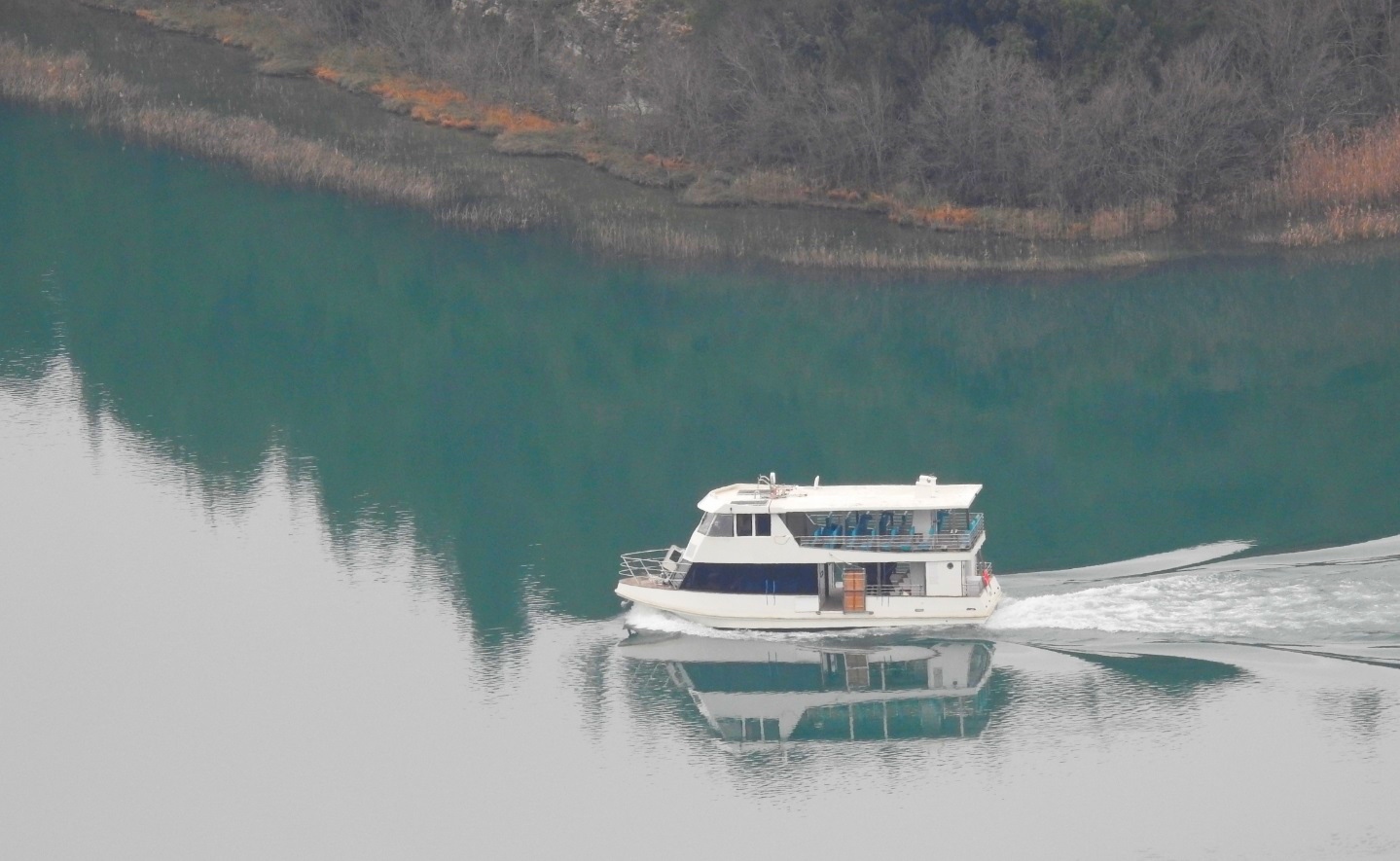
New modern boat / Photo: Krka National Park

Skradinski Buk waterfall / Photo: Romulić and Stojčić
The pier leading to the middle course of the Krka can be reached via Lozovac, the gateway to Krka National Park.
Namely, when the powerful travertine barrier of Skradinski Buk rose, Krka became a lake unto the island of Visovac, and the mouth of the Čikola river actually sank. This is how the most unusual confluence in Croatia was created.
The Kaličko sod, which is a travertine barrier of about 700 metres in length and only ten metres in width, separates Krka from the mouth of the Čikola. Thus, one sees the exact place where for thousands of years, the Čikola, after travelling through a narrow canyon, spreads wide, rushing into Krka's arms.
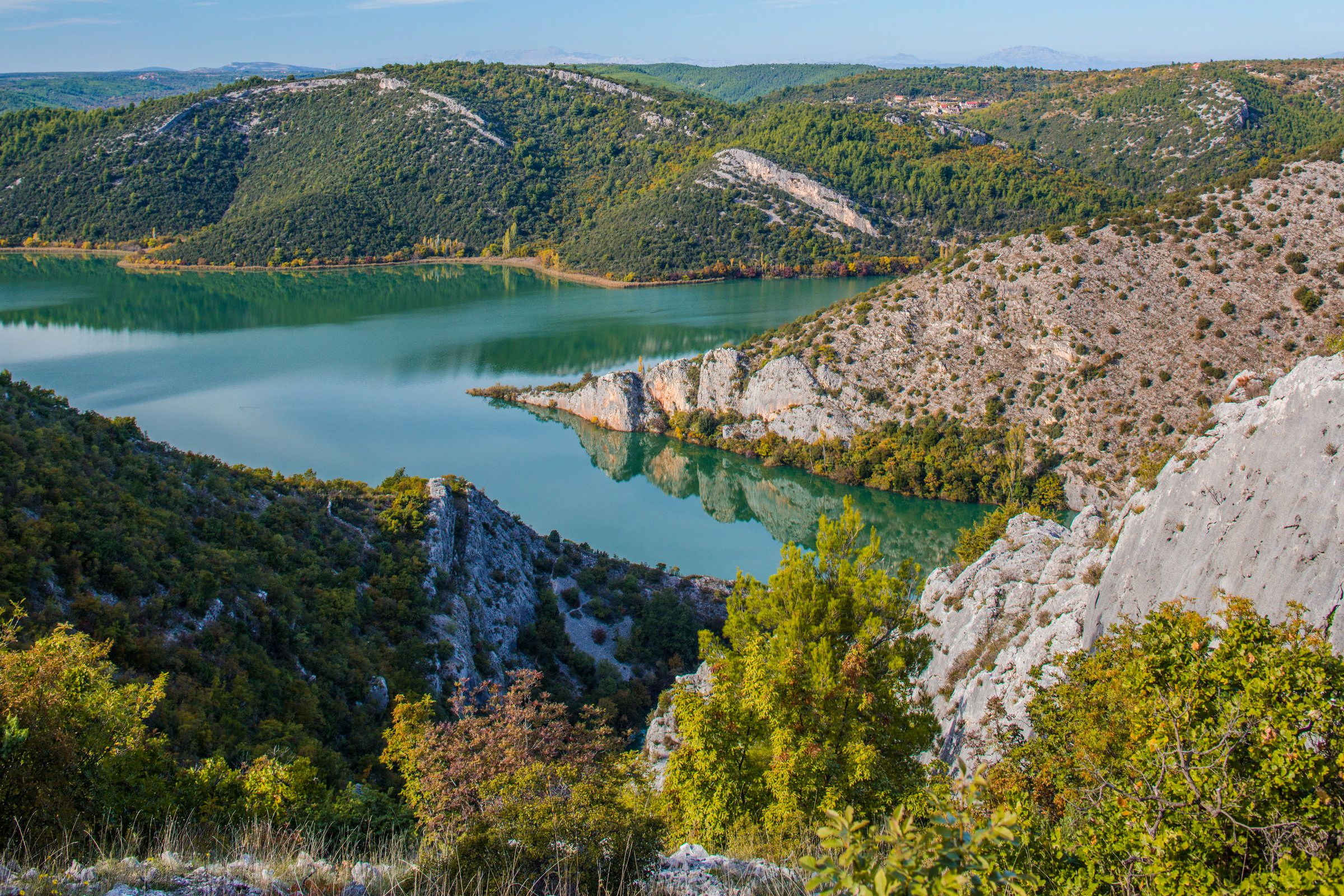
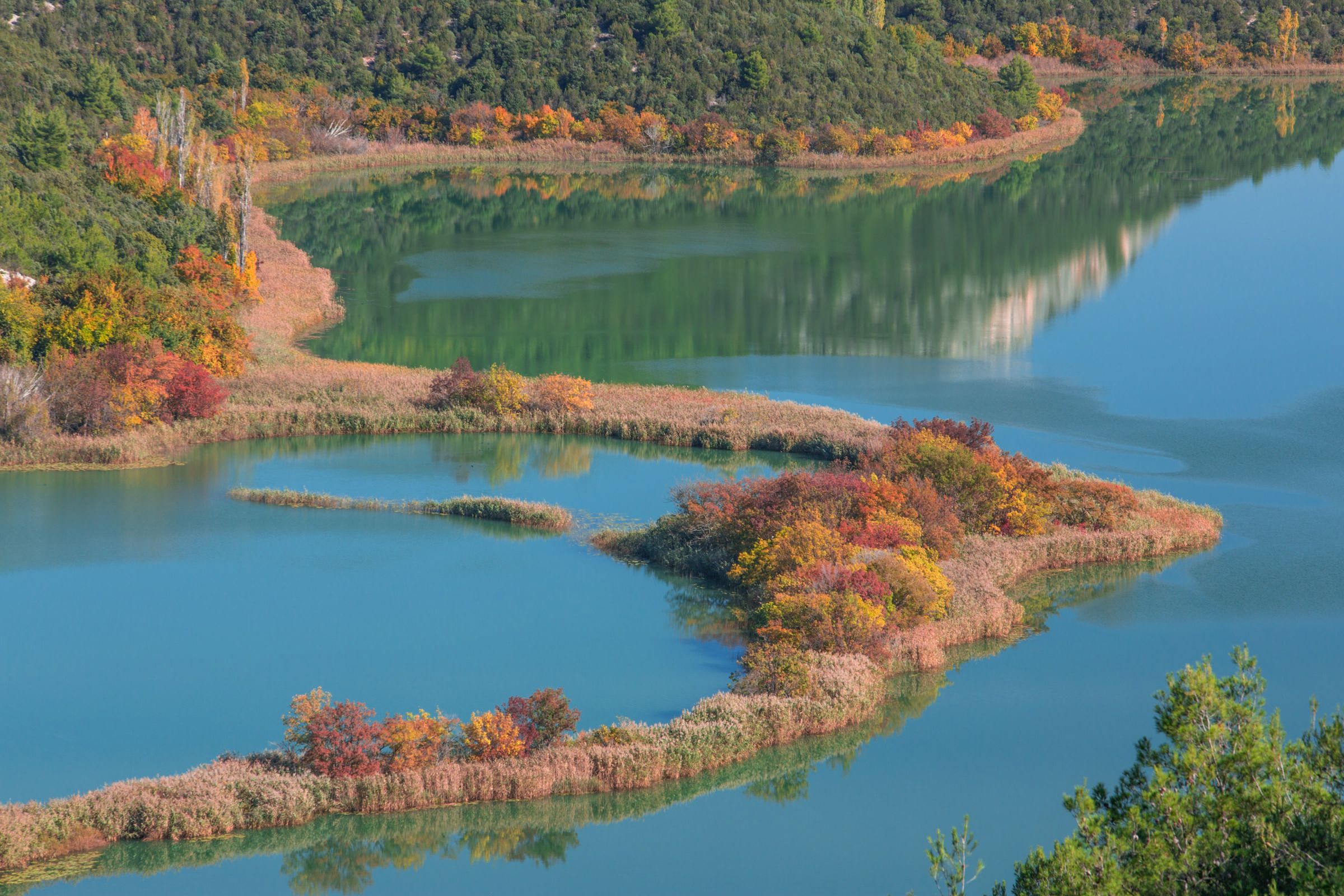
The confluence of the river Čikola and the river Krka / Photo: Romulić and Stojčić
Excursion boats sail right around the Kaličko sod, transporting visitors to the island of Visovac along the lake-like course of the river. In the centre of the fairytale confluence of the two rivers is Torak, a spring in the shape of a lake. Although it is a spring, it looks more like a lake due to its round shape, so it's referred to as a lake spring.
The whole area is under the protection of the parish of Konjevrate, over which St John the Baptist watches.
An attraction more than 100 years old
The new boat has one open and one closed deck, with comfortable seats and an air conditioning system. This modern vessel is also equipped for people with disabilities.
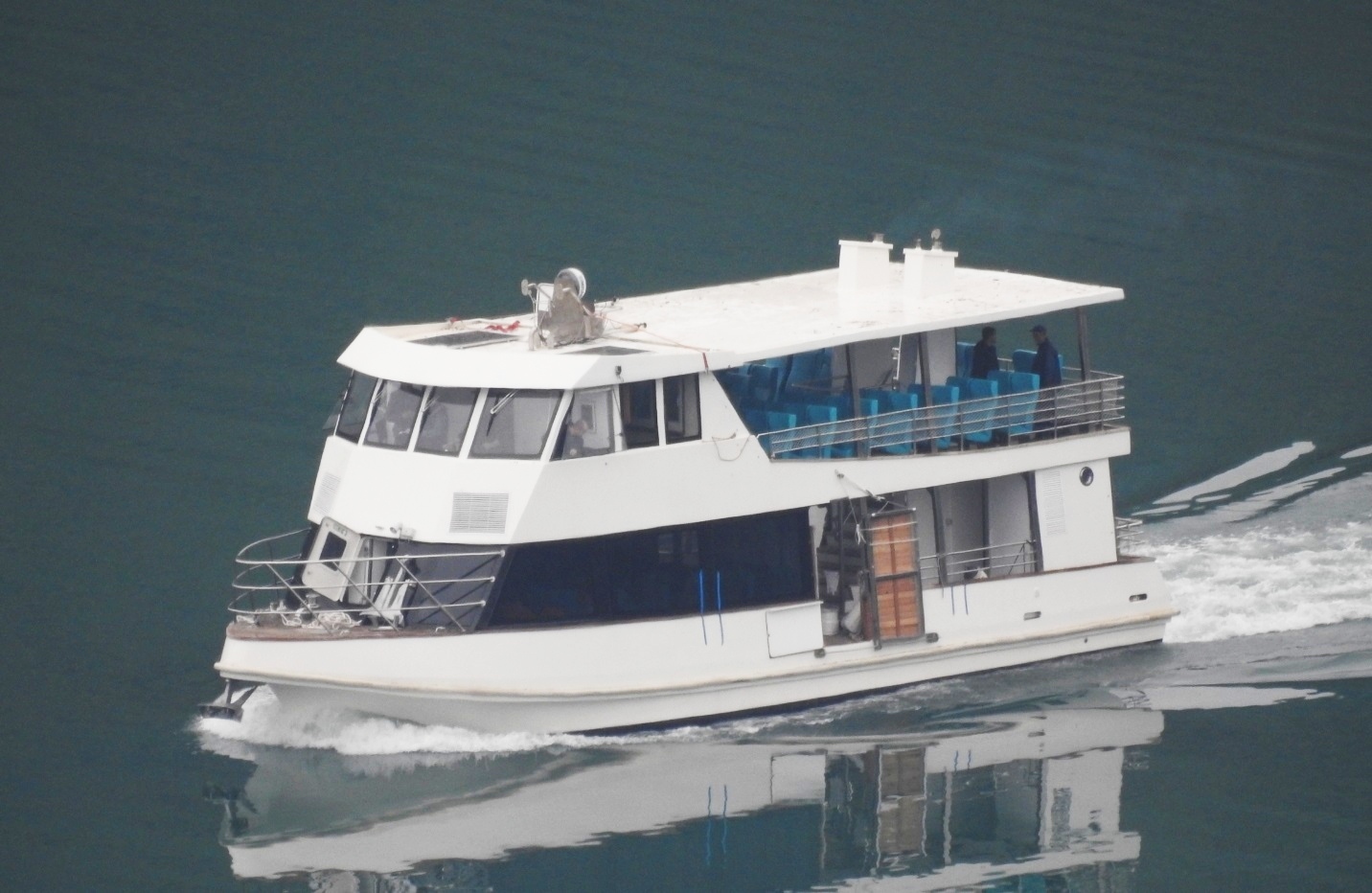
New modern boat / Photo: Krka National Park
"Krka National Park organises boat transport from Skradin to the Skradinski Buk waterfall and excursion boats from Skradinski Buk to Visovac and the Roški slap waterfall. The boats depart from Stinice and Remetić to Visovac, and two excursions also depart from Roški Slap. Visitors especially enjoy boating, so we must provide them with a complete experience of sailing on the river in safe and modern boats," said Nella Slavica, Krka National Park's director.
The first excursion ship that transported Roški Slap visitors to Visovac and Skradinski Buk was launched way back on March the 31st, 1912. After more than a hundred years of operation, this route is still one of the biggest attractions in the entire park and as such is always of great interest to visitors.
For the latest travel info, bookmark our main travel info article, which is updated daily.
Read the Croatian Travel Update in your language - now available in 24 languages.
New Croatian Webshop Tipsy Delivers Drinks and Condoms in 150 Minutes
February the 12th, 2021 - Remember in pre-pandemic times when you could freely organise a house party or just have people over to your place without a care in the world? The Croatian webshop Tipsy seems to be preparing for precisely the return of that.
As Novac/Bernard Ivezic writes, when the country's anti-epidemic measures relax and the powers that be allow it, you'll now be able to organise a house party within a mere 150 minutes without moving from your armchair. The new Croatian webshop Tipsy delivers drinks, snacks, platters, ice and even condoms within the aforementioned period, but only in the Zagreb area. In the rest of Croatia, it uses a delivery service with which the process lasts as is standard for online stores, with deliveries arriving in one to three days, especially if said delivery is going to the islands. Such fast delivery has so far existed mostly only for items like laptops, food and various office supplies.
Tipsy isn't a new Croatian startup. However, it is a local project, a very competitive web store, which was conceived a little over four months ago by three friends known for selling and promoting wine through Wine & more - Ivan Kovacevic, Dario Drmac and Dubravko Vancas.
"More than 200 people have signed up for Tipsy's newsletter, our deliveries are regular, and we've already been contacted by entrepreneurs from neighbouring countries who are interested in franchising. It seems a bit too early for us although we're convinced that our concept makes sense, regardless which, unlike our other projects, is focused on the Croatian market,'' said Drmac.
He added that they started thinking about the Croatian webshop Tipsy when they realised last year that the closing of the catering and hospitality ''world'' would be repeated throughout the pandemic. Drmac says their primary business is in HoReCi. He states that they had a warehouse full of a variety of drinks and that they could offer competitive prices out there on the market. However, at the time of the economy's closure, their main customers, like caterers and hospitality businesses, were all but written off. It also helped that retail chains successfully switched their sales process to the Internet, and despite a slight decline in sales, they recorded growth in the segments in which Tipsy also operates.
"Still, it wasn't enough just to start a webshop and be done with it, when there are already a million of them, and so based on the experience we gained in marketing and in online sales, Ivan and I, together with Dubravka, who has extensive experience in HoReCa, started an enterprise that puts emphasis on fast delivery and that somewhat different approach,'' Drmac said.
Ivan Kovacevic refers back to his experience in marketing and online sales of glass on projects such as Konzum Klik, today's largest online retail store, and on the Volim meso/I love meat project.
"We worked on the Konzum Klik project from the very beginning, including working on the very first sales mobile app on the iPad in Croatia, which was made by Konzum. The other big project we worked on was Volim meso, and both of us pointed out that for the success of the Croatian webshop Tipsy, it is actually necessary to connect not only good sales logistics but also content, so that we're interesting to our customers like the likes of Coolinarika is to those who enjoy cooking,'' said Kovacevic.
Dubravko Vancas added that it isn't easy to sell drinks online due to the current epidemiological regulations in force in Croatia. Tipsy, he explains, therefore has working hours very similar to those of petrol stations.
"We may be able to sell drinks after 22:00, but we don't do that. If you want your drink(s) delivered the same day, so in a period of 150 minutes, you have to order it by 22:00. It's not that you can't buy it later, but if you do, you'll only get your order the next day. Such are the epidemiological measures. Likewise, if you're not an adult, and we check that in several ways, you can't buy from us," Vancas said.
Ivan Kovacevic says that they're still learning a lot as they go on when it comes to Tipsy. In addition to regulations, he says, they are still researching what customers on their new website actually want and how to provide it to them.
"It's interesting that delivery is extremely important with this type of webshop. This is one of the reasons why we're currently mostly focused on Zagreb, because we have our suppliers here. We have customers who remember those suppliers and establish a very friendly relationship with them. Some even ask for a certain driver to deliver their drinks to them,'' concluded Kovacevic.
For the latest travel info, bookmark our main travel info article, which is updated daily.
Read the Croatian Travel Update in your language - now available in 24 languages.


